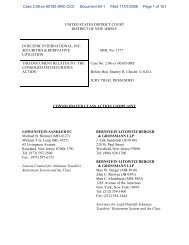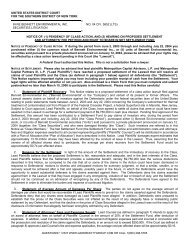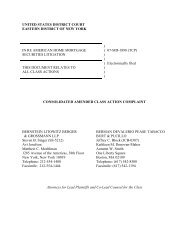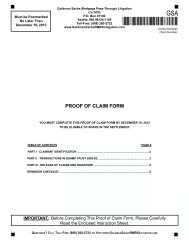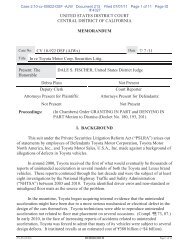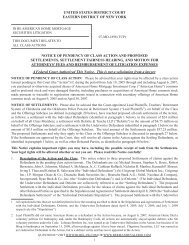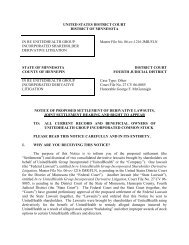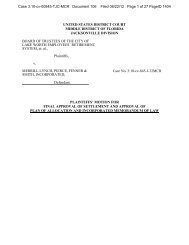to view the Lawdragon's - Bernstein Litowitz Berger & Grossmann LLP
to view the Lawdragon's - Bernstein Litowitz Berger & Grossmann LLP
to view the Lawdragon's - Bernstein Litowitz Berger & Grossmann LLP
Create successful ePaper yourself
Turn your PDF publications into a flip-book with our unique Google optimized e-Paper software.
500Lawdragon Q & A with:Gerald ShargelBy john ryanWho would you hire if caught up in acomplex criminal case – murder, racketeering, bribery,any type of fraud – facing <strong>the</strong> prospect of spending <strong>the</strong>rest of your life, or <strong>to</strong>o much of it, in prison? Take thatquestion <strong>to</strong> New Yorkers familiar with <strong>the</strong> city’s legalelite, and Gerald Shargel’s name might be <strong>the</strong> mostcommon response.The trial lawyer’s trial lawyer – who in <strong>the</strong> earlyyears was known more as an appellate star (see <strong>the</strong>1972 Supreme Court case Giglio vs. U.S.) – alwaysseems <strong>to</strong> find himself in <strong>the</strong> news, and now on film.Shargel guided Dave Letterman blackmailer JoeHalderman <strong>to</strong> a guilty plea, and he did <strong>the</strong> same fordisgraced Dreier <strong>LLP</strong> head Marc Dreier, which earnedShargel a supporting role in <strong>the</strong> documentaryUnraveled. Of course, he is best known for defendingmobsters like Hell’s Kitchen’s James Coonan and <strong>the</strong>Gottis of <strong>the</strong> Gambino crime family. In one caseagainst John Gotti Sr., U.S. District Judge Leo Glasserreferred <strong>to</strong> Shargel and partner Bruce Cutler as “housecounsel” for <strong>the</strong> Gottis and removed <strong>the</strong>m from <strong>the</strong>case; Shargel himself was <strong>the</strong> target of a multi-yearfederal investigation in<strong>to</strong> his relationship with <strong>the</strong> mob– no charges were brought.That colorful his<strong>to</strong>ry sometimes obscures <strong>the</strong> diversityof his consistently successful criminal defense practice;Shargel generally does not discriminate against certaintypes of defendants as long as <strong>the</strong> stakes are high.LAWDRAGon: In <strong>the</strong> documentary Unraveled, MarcDreier seemed <strong>to</strong>rn between accepting what he did andtrying <strong>to</strong> minimize his crimes. Did you sense a certainamount of denial on his part?GERALD SHARGEL: Well, he’s not in denial about his predicament.He’s accepted <strong>the</strong> reality that he’s serving a20-year prison term as well as anyone could expect, andin a certain sense, he’s in a state of grace. He realizedfrom <strong>the</strong> moment he was arrested – I think it’s clear in<strong>the</strong> film – that life as he knew it was over, or at leas<strong>to</strong>ver for a very long time. The film was shot over 60days, and I think that by <strong>the</strong> end he was fully remorsefuland accepting of responsibility for what he did.LD: With your cases defending Mafia figures, some ofyour fellow lawyers have wondered why you would handlethose types of cases given that you could remainbusy without <strong>the</strong>m.GS: I don’t apologize for any of that. I’m a criminaldefense lawyer. That means I represent people chargedwith serious crimes and do my level best <strong>to</strong> raise reasonabledoubt, and <strong>to</strong> see that <strong>the</strong>y are acquitted. Itdoesn’t always work. But I don’t look down my nose atany particular kind of case. Even in <strong>the</strong> last few years,I’ve represented a number of people that <strong>the</strong> governmentcalls mobsters.LD: You’ve been quoted before as saying you like “<strong>the</strong>action.” What do you mean by that?GS: I like <strong>the</strong> action of high-profile cases. I’ve been fortunate<strong>to</strong> have a disproportionate number of high-profilecases. You know, walking in<strong>to</strong> a packed courtroom, orwalking in<strong>to</strong> a courtroom where ano<strong>the</strong>r room has aclosed-circuit feed because <strong>the</strong> first room has filled up,<strong>to</strong> cross examine somebody under those circumstances– well, if you don’t like that, you don’t want <strong>to</strong> be a triallawyer. I like <strong>the</strong> public attention, <strong>the</strong> scrutiny; I like itwhen <strong>the</strong> press section is full. I think any trial lawyerwould welcome that. It’s what I live for.LD: Have you ever had any second thoughts about <strong>the</strong>mix of cases? After all, in a wiretapped conversation,John Gotti threatened <strong>to</strong> kill you.GS: I never believed that he meant it. I was in <strong>the</strong> processof trying <strong>to</strong> win an acquittal for him. He was anoperatic person. I actually think that matrimonial lawyersare more at risk. This is not a practice for <strong>the</strong> thinskinned,but after 42 years I am still chugging along.LD: How about <strong>the</strong> federal government’s investigationof you? That must have been incredibly frustrating andnerve-wracking and threatening <strong>to</strong> your practice.GS: I would have preferred that it never happened. Butgoing back <strong>to</strong> what I said, it is not a practice for <strong>the</strong>thin skinned. If I look back at <strong>the</strong> trajec<strong>to</strong>ry of mypractice, <strong>the</strong> bar in <strong>the</strong> graph goes up during thoseyears. The adverse publicity did not s<strong>to</strong>p my practicefrom growing.LD: Has your courtroom style changed over <strong>the</strong> years?GS: Trial lawyers are like folk singers: They don’t copyo<strong>the</strong>r styles that came before, but <strong>the</strong>y are influencedby <strong>the</strong>m. I had a lot of influences from older lawyerswho practiced in a different era. For a while I wasprobably more dramatic than I needed <strong>to</strong> be. I thinkover <strong>the</strong> years that’s quieted down. My approach <strong>to</strong> trialsis not kicking and screaming and calling <strong>the</strong> government<strong>the</strong> Evil Empire. My approach is, “Let’s all reason<strong>to</strong>ge<strong>the</strong>r,” and I try <strong>to</strong> persuade <strong>the</strong> jury I have amore reasonable interpretation of <strong>the</strong> evidence.Sometimes you are more effective with a softerapproach. But if a situation calls for sarcasm, I’ll be assarcastic as anyone else. See <strong>the</strong> full Q&A at www.lawdragon.com/lawyer-limelights/gerald-shargel.L A W D R A G O N 78 I s s u e 13 Pho<strong>to</strong> by: Laura Barisonzi



